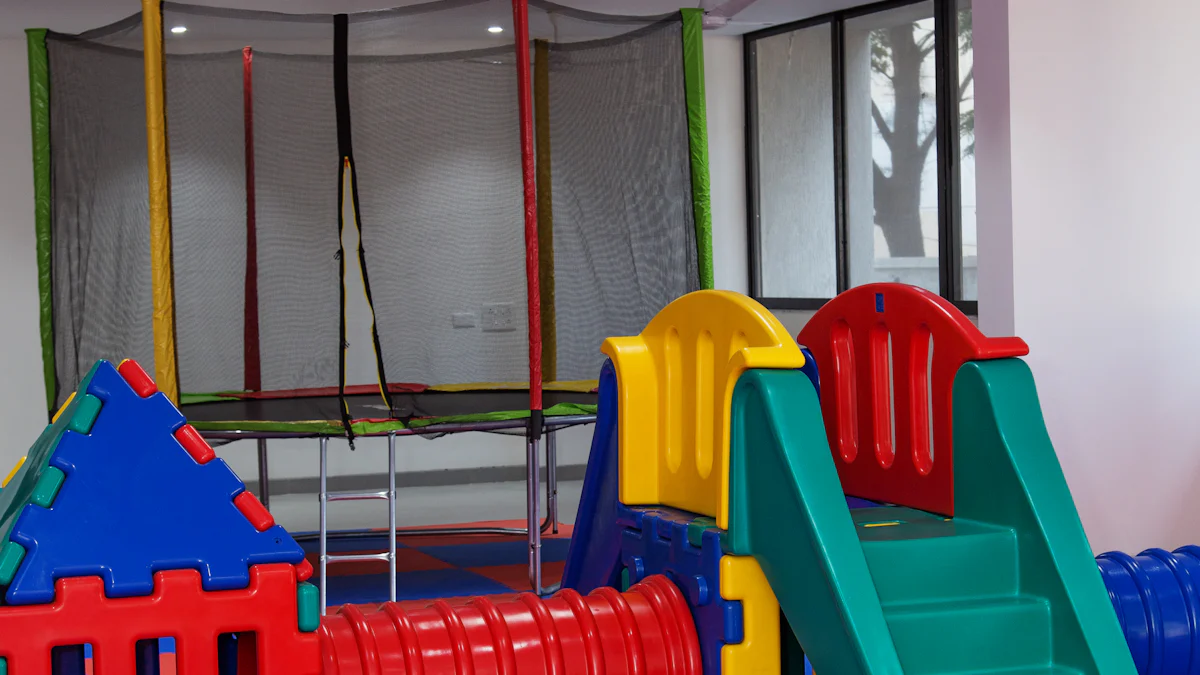How to Create a Positive and Supportive Home Environment for Kids
A positive home environment plays a crucial role in children's development. Children thrive when surrounded by positivity. A nurturing atmosphere fosters growth and learning. A positive home environment encourages curiosity and exploration. This setting creates a positive learning environment that supports emotional and intellectual growth. Parents can boost adult literacy by modeling positive behaviors. A positive home environment builds confidence and resilience. Children feel safe and valued in such spaces. A positive learning environment promotes creativity and problem-solving skills. The benefits of a supportive atmosphere extend beyond childhood, shaping future success.
Creating a Positive Home Environment

Spending Quality Time Together
Importance of Family Bonding
Family bonding strengthens relationships and builds trust. Children feel loved and secure when families spend time together. Shared experiences create lasting memories. Family bonding fosters emotional connections. A strong family bond supports children's development. Digital distractions often interfere with family time. Prioritize face-to-face interactions to strengthen bonds. Encourage conversations during meals or outings. Family bonding nurtures a sense of belonging. Children thrive in environments where they feel connected.
Planning Family Activities
Plan activities that engage every family member. Choose activities that promote fun and learning. Outdoor adventures encourage exploration and curiosity. Indoor games stimulate creativity and problem-solving skills. Include children in planning to boost their confidence. Family activities can include cooking, hiking, or crafting. Digital tools offer new ways to explore interests together. Use apps and online resources for creative ideas. Planning family activities encourages teamwork and cooperation. Shared activities strengthen family ties and create joy.
Creating Traditions
Traditions provide stability and comfort. Families create traditions to celebrate special occasions. Traditions can include holiday rituals or weekly game nights. Consistent traditions offer predictability and security. Children look forward to familiar routines and celebrations. Traditions reinforce family values and beliefs. Involve children in creating new traditions. Encourage children to share their ideas for family customs. Digital platforms can help document and share family traditions. Traditions connect generations and build a sense of heritage.
Organizing Functional Areas
Creating Child-Friendly Spaces
Child-friendly spaces promote independence and creativity. Design spaces that encourage exploration and play. Use furniture and decor that suit children's needs. Organize toys and books for easy access. Create zones for different activities like reading or art. Child-friendly spaces support a positive learning environment at home. Digital resources offer inspiration for designing these areas. Use online tips and resources for organizing ideas. Child-friendly spaces foster a sense of ownership and pride.
Safe Play Areas
Safe play areas protect children from harm. Ensure play areas are free from hazards. Use safety gates and covers for electrical outlets. Soft surfaces reduce the risk of injury. Supervise children during playtime for added safety. Safe play areas encourage active play and physical development. Digital tools can help monitor and enhance safety. Use apps to track children's playtime and activities. Safe play areas provide peace of mind for parents.
Study Zones
Study zones support focused learning. Create dedicated spaces for homework and projects. Use comfortable seating and adequate lighting. Organize supplies for easy access and efficiency. Study zones minimize distractions and promote concentration. Digital learning tools enhance study sessions. Use educational apps and online resources for support. Study zones encourage a positive learning environment at home. Involve children in setting up their study spaces. Personalize study zones to reflect children's interests.
Establishing Open Communication
Open communication forms the backbone of a supportive home environment. Encouraging expression and resolving conflicts positively help children feel heard and valued. Building these skills fosters trust and understanding within the family.
Encouraging Expression
Active Listening Techniques
Active listening helps children feel respected and understood. Active listening helps children. Digital Promise and Learning Heroes emphasize the importance of active listening in nurturing a child's confidence. Implementing these techniques strengthens family bonds and promotes emotional growth.
Creating a Safe Space for Sharing
A safe space for sharing allows children to express thoughts and feelings without fear. Set aside time each day for open discussions. Use positive language to foster a welcoming atmosphere. Encourage honesty by being non-judgmental. Validate emotions by acknowledging the child's feelings. Create an environment where children feel comfortable discussing any topic. A safe space supports emotional well-being and builds trust. Children develop positive communication skills in such environments.
Resolving Conflicts Positively
Teaching Conflict Resolution Skills
Conflict resolution skills empower children to handle disagreements constructively. Teach children to identify the problem and express their feelings calmly. Encourage finding solutions that satisfy everyone involved. Practice role-playing scenarios to build confidence. Reinforce the importance of compromise and empathy. Conflict resolution skills help children navigate social interactions effectively. Children learn to manage emotions and maintain healthy relationships.
Modeling Respectful Communication
Modeling respectful communication sets a powerful example for children. Use polite language and tone when addressing others. Demonstrate patience and understanding during disagreements. Show appreciation for different perspectives. Encourage children to do the same in their interactions. Respectful communication fosters a harmonious home environment. Children learn to treat others with kindness and respect. Digital Promise and Learning Heroes highlight the role of respectful communication in building strong family connections. By modeling these behaviors, you help your child develop positive communication habits.
Ensuring a Safe and Supportive Atmosphere

Creating a safe and supportive atmosphere at home is essential for nurturing a child's growth and well-being. A secure environment allows children to explore, learn, and thrive without fear. By implementing physical safety measures and providing emotional support, families can create a positive home environment that fosters development and happiness.
Physical Safety Measures
Childproofing the Home
Childproofing your home ensures that children can explore safely. Secure furniture to prevent tipping. Install safety gates to restrict access to hazardous areas. Cover electrical outlets to avoid accidents. Use cabinet locks to keep dangerous items out of reach. Ensure that sharp objects and small items are stored safely. A childproofed home provides peace of mind for families. Children can play and learn in a secure environment.
Emergency Preparedness
Emergency preparedness equips families to handle unexpected situations. Create an emergency plan that includes escape routes and meeting points. Teach children how to call for help and what to do in case of emergencies. Keep a first-aid kit and emergency supplies accessible. Regularly practice emergency drills with the family. Being prepared helps families respond calmly and efficiently during crises. Children feel more secure knowing that their home is ready for emergencies.
Emotional Support
Recognizing Emotional Needs
Recognizing emotional needs is crucial for a child's well-being. Pay attention to changes in behavior or mood. Offer a listening ear when children express feelings. Validate emotions by acknowledging their experiences. Provide comfort and understanding during difficult times. Emotional support strengthens the bond between family members. Children feel valued and understood in a supportive home environment.
Providing Reassurance and Encouragement
Providing reassurance and encouragement boosts a child's confidence. Celebrate achievements, no matter how small. Offer words of affirmation and praise for efforts. Encourage children to pursue interests and hobbies. Support their curiosity and creativity. Families that provide encouragement foster a positive atmosphere. Children develop resilience and self-esteem in such environments.
Psychology Today contributor Steve Baskin highlights the importance of encouraging independence for children's growth. By creating a supportive home environment, families empower children to become confident and capable individuals. Digital Promise emphasizes the role of a positive learning environment in supporting children's academic progress and well-being. Families can create a nurturing home that promotes both safety and emotional growth.
Maintaining Routines
Creating consistent routines provides stability and comfort for children. Routines help kids know what to expect each day. This predictability reduces stress and anxiety. Families benefit from routines that promote harmony and balance. Children thrive in environments where routines guide daily activities.
Importance of Consistency
Establishing Daily Schedules
Daily schedules create a framework for learning and growth. Set specific times for meals, homework, and play. Consistent schedules encourage discipline. Children learn time management skills through structured routines. Surveys show that routines positively impact children's development. Families experience smoother days with clear schedules. Teachers often recommend routines to support academic success.
Flexibility within Structure
Flexibility within routines allows for adaptation and creativity. Encourage children to explore new interests within a structured day. Balance structure with opportunities for spontaneous learning. Flexibility helps children develop problem-solving skills. Families can adjust routines to accommodate special events. Teachers emphasize the importance of adaptability in learning environments. Children learn resilience when routines adapt to life's changes.
Adapting Routines as Kids Grow
Age-Appropriate Adjustments
Adjust routines to match children's developmental stages. Younger children need more playtime and rest. Older children benefit from increased responsibilities. Tailor routines to support individual learning needs. Diana Lee highlights the importance of age-appropriate routines. Families should regularly review and update routines. Teachers provide guidance on adjusting routines for different ages.
Involving Kids in Planning
Involve children in planning their routines to foster independence. Encourage kids to share their preferences and ideas. Collaborative planning boosts confidence and decision-making skills. Children feel valued when they contribute to family routines. Learning Heroes suggests involving children in routine planning. Families strengthen connections through shared decision-making. Teachers support student involvement in creating classroom routines.
Digital Promise and Learning Heroes emphasize the role of routines in fostering a positive home environment. Families create nurturing spaces by maintaining routines that support learning and growth. Children flourish in homes where routines guide their daily lives.
Encouraging Independence
Empowering children to make decisions builds confidence. Children learn to trust their instincts and develop problem-solving skills. Encouraging independence prepares them for future challenges. Innovative Leaders are Prioritizing this approach, recognizing its long-term benefits.
Fostering Decision-Making Skills
Allowing Choices
Allowing choices gives children a sense of control. Offer options in daily activities like meals or clothing. This practice teaches decision-making and boosts confidence. Children learn from both successes and mistakes. These experiences shape their understanding of consequences.
Teaching Responsibility
Teaching responsibility involves assigning age-appropriate tasks. Simple chores like setting the table or organizing toys instill accountability. Children feel proud when they contribute to the household. Responsibility nurtures self-discipline and reliability. These qualities support personal growth and maturity.
Supporting Self-Expression
Encouraging Hobbies and Interests
Encouraging hobbies fosters creativity and passion. Provide materials and resources for exploration. Support interests in music, art, sports, or science. Children discover talents and build self-esteem through hobbies. Learning becomes an exciting journey of discovery.
Celebrating Achievements
Celebrating achievements reinforces positive behavior. Acknowledge efforts and milestones with praise. Recognition motivates children to pursue goals. Celebrations create joyful memories and strengthen family bonds. Children feel valued and inspired to continue growing.
Stories of independent adventurers inspire young readers. These tales show that children can overcome obstacles and achieve greatness. Parents play a vital role in nurturing this independence. By fostering decision-making and supporting self-expression, families create a nurturing environment. Children thrive when given the freedom to explore and learn.
Creating a positive home environment for kids involves several key strategies. Spending quality time together strengthens family bonds. Organizing functional areas supports effective learning. Establishing open communication fosters trust and understanding. Ensuring a safe atmosphere provides security for exploration. Maintaining routines offers stability and comfort. Encouraging independence builds confidence and decision-making skills. Implement these tips to create a nurturing space that benefits the entire family. Digital Promise and Learning Heroes offer valuable resources for families seeking guidance. Embrace these strategies to cultivate a supportive and enriching environment for your child's growth and development.
See Also
Tips for Inspiring Children with Positive Energy
Ways to Ensure Children Feel Appreciated
Strategies for Nurturing Emotionally Strong Children

